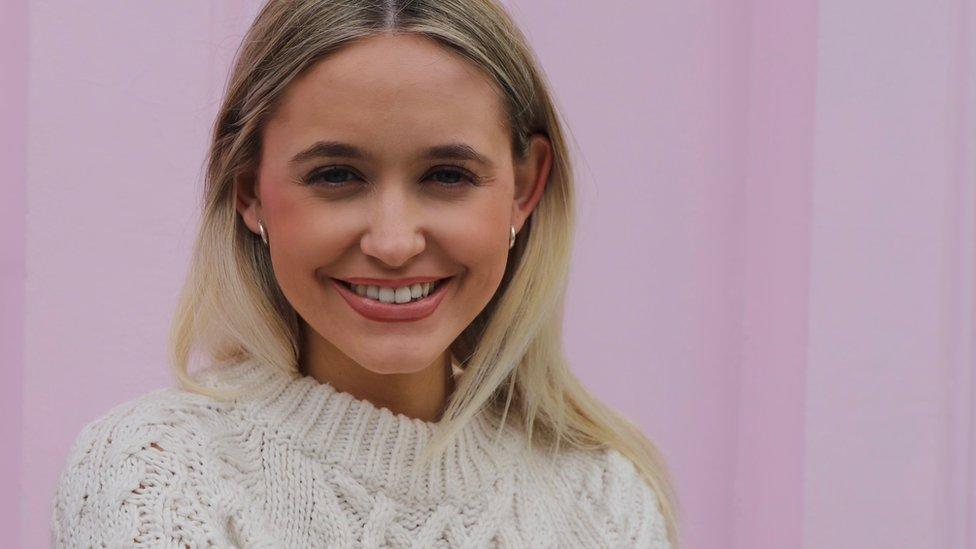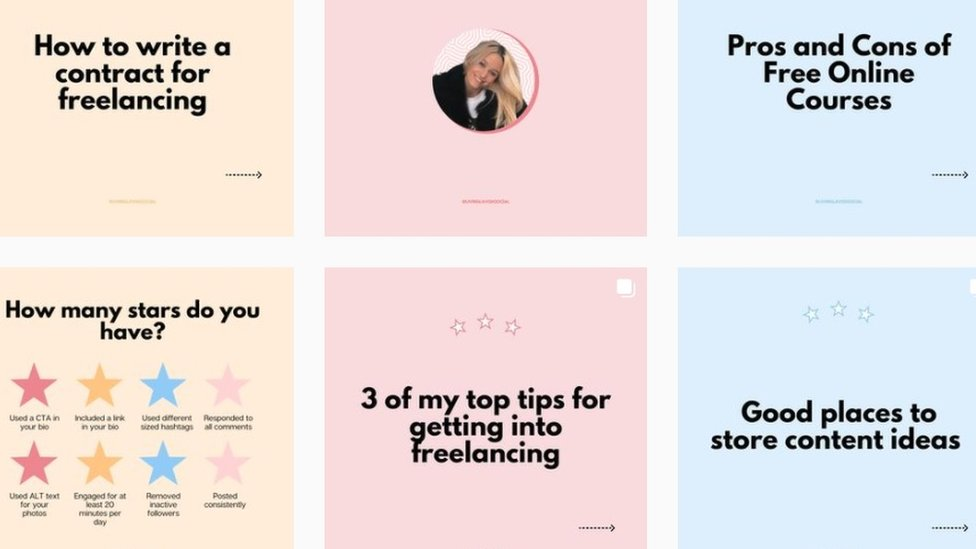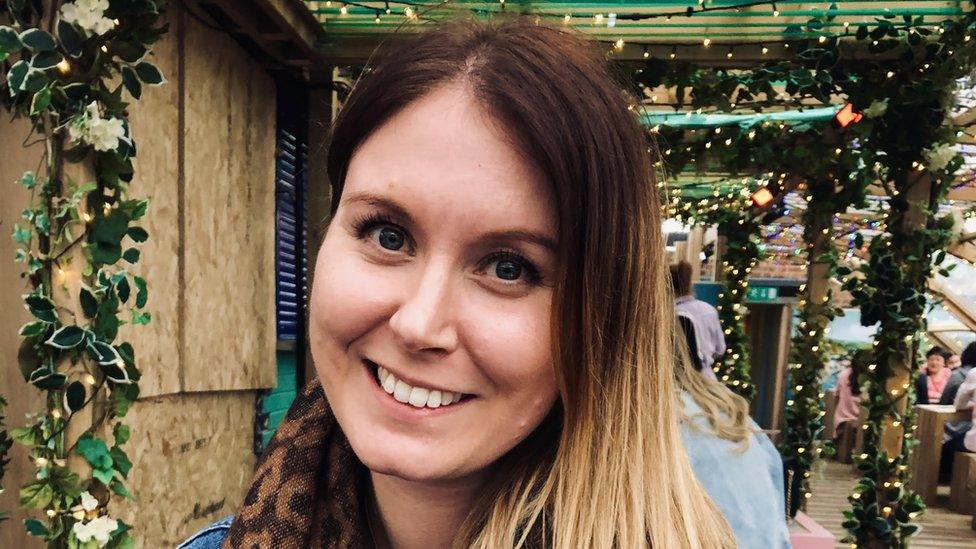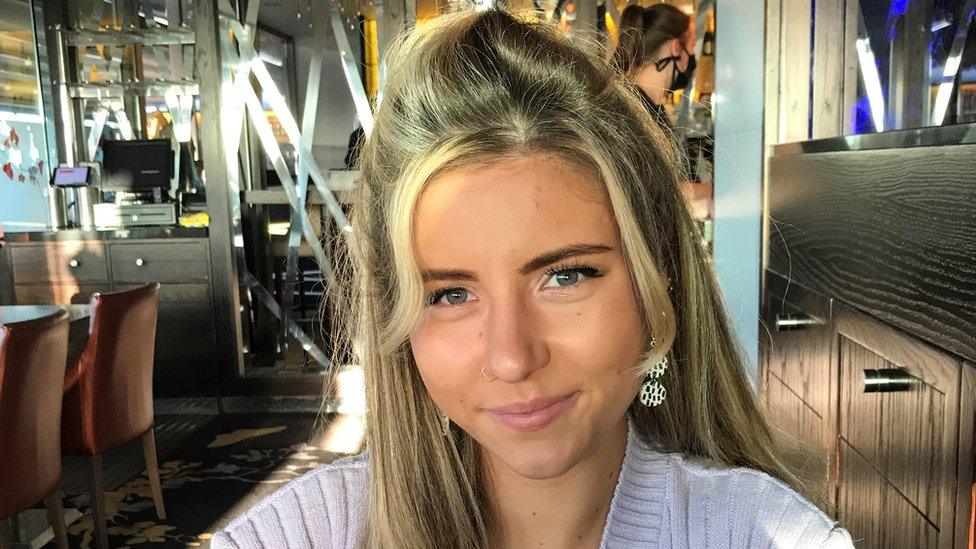'My Instagram account gave me confidence and purpose'
- Published

Olivia Crowley got 30 rejections to her job applications
When Olivia Crowley graduated from university last summer she found it all but impossible to find a job.
With the coronavirus pandemic in full swing, the UK jobs market had come to a standstill - hardly any firms were hiring.
Young people like Olivia, 22, were particularly badly affected, as official figures showed. While the UK unemployment rate was 4.5% for June to August 2020, external, it soared to 14.1% for 16 to 24-year-olds, external.
"It was so competitive, and I just didn't know how I was going to find a job," says Olivia, from Essex, who got a degree in creative media practice from Bath Spa University.
She wanted to find a job in marketing, and for a few months she took a very traditional approach - sending out her CV and hoping for the best. Unfortunately all she got was 30 rejections. And there were no unpaid internships available either.
"I felt lonely trying to figure out how to make a dent in the industry, but without anyone to turn to," she says.
Ultimately Olivia realised that she would have to take matters into her own hands and think creatively. So she set up her own Instagram page and business called Living Lavish Social, a social media marketing company. It gives advice to business owners about how to market their companies on Instagram.
Within weeks she had got her first client, and her second followed soon after. "I would split up my day with job hunting, upskilling, and then working on the business."

Olivia's Instagram page Living Lavish Social aims to give a wealth of information and advice
Gemma Stephenson, a expert on graduate job hunting, says that the use of social media to find work, or set up your own business or network, has been a growing trend among university leavers during the pandemic.
"There's been so much hardship for graduates," says Gemma, who is also the co-host of a careers podcast with the irreverent title of Let's Get You a [expletive] Job.
"But instead of admitting defeat, some have used social media to their advantage, building businesses from scratch, and showcasing their talents not just to their new clients, but potential employers too."
When Naomi Hollas, a 2019 graduate from Glasgow university, was put on furlough from her events jobs last March she felt deflated. A month later she was made redundant, and there were no other jobs out there in her sector.
"The events industry just had to stop abruptly, with no guidance or support," says the 25-year-old. "It was heart-breaking to watch. From a recent graduate perspective, we had just had a taste of the industry and all of a sudden it was taken away from us."
By June, Naomi admits she was feeling that she was exhausting her options. She had contacted people in her industry on Linkedin, but was getting nothing in return.
Feeling a bit lost, she started a private Facebook group, called Eventgrads, to build an online community for people who had graduated with an events degree.

Gemma Stephenson says a growing number of graduates are using social media to showcase their talents
"I shared it across my socials, and the number of members started to grow - going beyond my network," says Naomi. "Before I knew it I had nearly 2,000 people, and industry experts were talking about it."
She says that the Facebook group turned into the community she'd yearned for. "We were discussing everything from the roadmap, to recovery, to how we can build and support the events industry in other ways," she says.
"To be able to discuss and connect with others who understand what you are going through was beneficial to so many of us."
Naomi also branched out to Instagram and Twitter - sharing advice for graduates and those in the industry. Before she knew it, she was spending all her time working on the platform - hosting weekly Zoom calls with the group, updating the jobs board, and even setting up talks and mentoring programmes.
Both Naomi and Olivia say starting their social media platforms, and the focus it gave them, was hugely beneficial in the middle of what could otherwise have been a mentally challenging time for them.
"Starting Eventgrads was something to help me control the uncontrollable, a goal to focus on when everything was a bit hectic," says Naomi.
Olivia agrees: "Having the business to work on gave me purpose, I gained so much confidence. My Instagram account also allowed me to connect with people who were going through similar struggles - it felt like an extended university, full of like-minded people."
She adds: "My business was always the one thing that came up in interviews too - potential employers loved that I'd been proactive and spent my downtime creating a platform to gain more experience."
Olivia has now landed a job as a marketing and social coordinator for a skincare company, and still runs her start-up on the side.
Naomi has also subsequently found work, with an events business, and says that her Facebook group helped her get the job. She says her employer was "really impressed with the whole concept, and said it showed initiative".

Naomi Hollas has now found work with an events company
With UK unemployment among 16 to 24-year-olds still high - the latest official figure is 13.3% - Susannah Streeter, senior investment and markets analyst at financial services firm Hargreaves Lansdown, says it is "no surprise that some graduates are coming up with innovative solutions, like self-promotion via video clips or social media campaigns, to try and stand out from the crowd".
Olivia adds: "There is often the expectation, when you leave university, that you're going to get a job handed to you on a plate, but sometimes you have to go beyond the traditional methods of job hunting to get noticed."